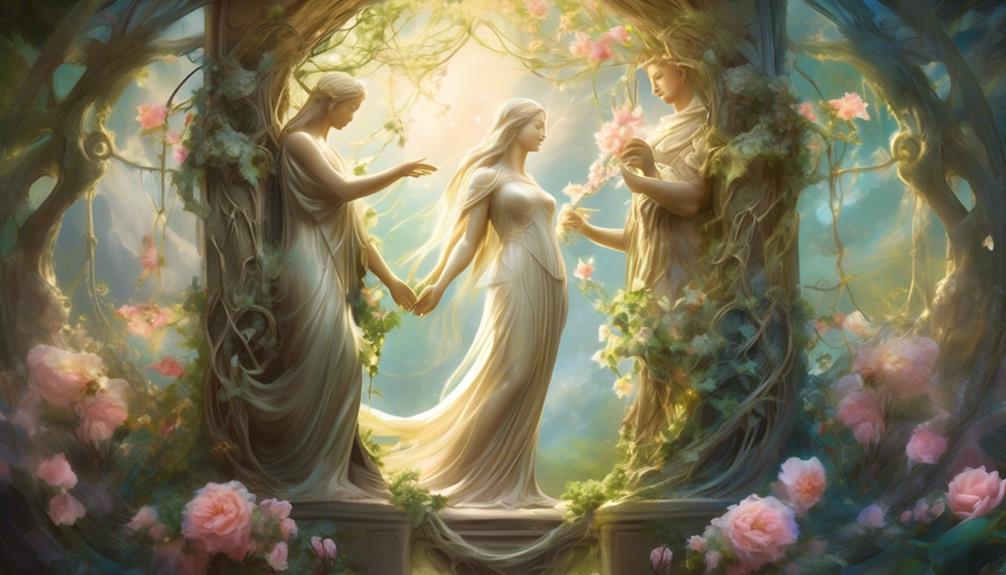In the realm of philosophy, the wisdom of love is a timeless and captivating subject that has intrigued scholars and seekers of truth for centuries. From the ancient philosophers to the modern thinkers, their profound insights into the nature of love have the power to ignite the flame of inspiration within our hearts.
Consider, for instance, the words of Plato when he proclaimed, 'At the touch of love, everyone becomes a poet.' These profound words invite us to explore the transformative power of love and its ability to awaken our innermost passions and creativity.
As we embark on this journey through the wisdom of love, we are invited to uncover the deeper truths that lie within these ten inspiring quotes, each offering a unique perspective that will leave us yearning for more.
Key Takeaways
- Love is a transformative force that has the power to bring about positive change in individuals and society.
- Love is a journey of self-discovery and personal growth, leading to inner transformation and the realization of our true selves.
- Love is a universal language that transcends cultural and linguistic barriers, fostering connection, empathy, and understanding among all people.
- Love plays a significant role in the search for meaning and purpose in life, offering transcendence and rebellion against the absurdity and meaninglessness of existence.
Ancient Wisdom: Love as the Source of Harmony

Ancient wisdom intertwines the threads of love, weaving a tapestry of harmony that resonates through the ages. Love, according to ancient philosophers, is the cornerstone of harmony. It's the force that fosters unity and balance within human interactions. Love isn't just a fleeting emotion, but a profound essence that permeates our very being. It's the source of inner peace and societal cohesion.
As the great philosophers have proclaimed, love promotes understanding, empathy, and compassion among individuals. It has the power to transform not only ourselves but also the communities we inhabit. Love, with its infinite capacity to inspire and heal, has been celebrated by countless philosophers throughout history. Their words serve as timeless reminders of the profound impact love can have on our lives.
Here are two inspirational quotes that encapsulate the wisdom of ancient philosophers on the subject of love and harmony:
- 'Love is the harmony of two souls singing together in perfect unison.' – Plato
- 'The greatest power in the world isn't brute force, but the power of love, which can bring about true harmony among all beings.' – Confucius
The Power of Love: Insights From Plato and Aristotle
Love's power, as illuminated by ancient wisdom, extends beyond the realm of harmony, as Plato and Aristotle reveal profound insights into its transformative nature.
From Plato's perspective, love is a force that can elevate the soul, leading one on a path towards truth and beauty. It's a catalyst for personal growth and the pursuit of higher ideals.
Aristotle, on the other hand, views love as an essential aspect of human flourishing and happiness. For him, love is virtuous and encompasses not just romantic relationships, but also friendships and the love of knowledge.
Both philosophers emphasize the enriching and transformative power of love, highlighting its ability to bring about positive change in individuals and society. Their timeless wisdom continues to resonate with those who seek a deeper understanding of love's potential.
Love's Transformative Nature: Reflections by Friedrich Nietzsche

With Nietzsche's profound reflections, love unveils its transformative essence, beckoning individuals towards the metamorphosis of their inner selves. Nietzsche's perspective on love highlights its potential to bring about personal growth and inner transformation. His reflections emphasize love's ability to inspire individuals to strive for self-improvement and self-realization.
Love, according to Nietzsche, has the power to lead to a profound metamorphosis of one's inner self. It isn't merely a fleeting emotion but a catalyst for change, a force that propels individuals towards a higher state of being. Love's transformative nature calls upon us to embrace vulnerability, to confront our deepest fears and desires, and to embark on a journey of self-discovery.
It's through love that we can transcend our limitations, break free from societal constraints, and become the best version of ourselves.
Love and Existentialism: Quotes From Jean-Paul Sartre
How does Jean-Paul Sartre's existentialist philosophy shed light on the complexities and depths of love?
In the realm of existentialist love, Sartre's philosophy challenges conventional notions, urging us to explore the individual's responsibility and freedom within relationships.
Love, according to Sartre, isn't a passive feeling but an active choice. It demands authenticity, a courageous surrender to vulnerability.
Sartre's quotes remind us that love isn't a destination but a continuous journey of self-discovery and growth. It's rooted in the freedom to choose and accept our own and others' individuality.
Love, in the existentialist lens, thrives on mutual respect, where each person takes responsibility for their own existence, while also honoring the existence of their partner.
Sartre's philosophy invites us to embrace the complexities and depths of love with unwavering authenticity.
Love as a Universal Language: Wisdom From Rumi and Kahlil Gibran

In the realm of human connection, the writings of Rumi and Kahlil Gibran illuminate the profound and transformative power of love, transcending cultural and linguistic barriers. Their wisdom and insight remind us of the universal language of love, which knows no boundaries and embraces all.
Through their teachings, they encourage us to cultivate a deep understanding of different cultures and to embrace diversity with open hearts. Rumi and Gibran's words inspire us to seek connection and empathy, fostering a sense of unity among all people.
Their timeless wisdom reminds us that love is the thread that weaves us together, guiding us towards a more compassionate and harmonious world. Through their profound insights, we're reminded of the beauty and importance of love in our lives and in the world.
Love and Compassion: Insights From the Dalai Lama
Love and compassion, intertwined like the delicate petals of a blooming flower, radiate from the profound insights of the Dalai Lama. His teachings remind us of the power of love and empathy, urging us to cultivate compassion in our lives.
The Dalai Lama emphasizes the importance of forgiveness, understanding that it's through forgiveness that we can release the burdens that weigh us down and find liberation. He encourages us to let go of anger and resentment, as they only hinder our ability to experience true love and compassion.
Love and Self-Discovery: Quotes by Carl Jung and Søren Kierkegaard

Entwined within the depths of the human soul, the philosophies of Carl Jung and Søren Kierkegaard intertwine love and self-discovery, illuminating the profound connection between knowing oneself and experiencing the transformative power of love.
Love, they say, isn't merely a matter of the heart, but a journey of personal growth and self-reflection. Through their wisdom, they convey that love has the potential to reveal our true selves, leading us to understand our deepest desires, fears, and aspirations. By embarking on this path, we can uncover hidden aspects of our being, allowing us to evolve and flourish.
In the realm of relationships, self-discovery becomes intertwined with love, as we learn not only about the other person but also about ourselves. Love, then, becomes a catalyst for self-discovery, a mirror that reflects our innermost essence and propels us towards personal growth.
Love and the Meaning of Life: Perspectives From Albert Camus and Viktor Frankl
With their profound contemplations on the complexities of human existence and the role of love in finding purpose, the philosophical perspectives of Albert Camus and Viktor Frankl illuminate the eternal quest for the meaning of life.
Both Camus and Frankl recognize the transformative power of love in shaping personal fulfillment and providing a sense of meaning in the face of existential angst.
For Camus, love serves as a rebellion against the absurdity of life, offering a fleeting glimpse of transcendence amidst the inherent meaninglessness of the human condition.
On the other hand, Frankl's logotherapy emphasizes the importance of love in connecting with others and finding purpose in serving them.
Through their distinct philosophical lenses, Camus and Frankl reveal that love, in its myriad forms, holds the key to unlocking the profound depths of human existence and the search for meaning in life.
Love and Relationships: Reflections by Simone De Beauvoir and Bell Hooks

As the philosophical journey continues, the profound reflections on love and relationships by Simone De Beauvoir and Bell Hooks emerge, shedding light on the intricate interplay of human connections and the complexities of the heart.
- Love and feminism: Both philosophers explore the intersection of love and feminism, emphasizing the importance of equality and agency within relationships.
- Love and power dynamics: De Beauvoir and Hooks delve into the power dynamics that often shape love and relationships, urging individuals to challenge oppressive structures and strive for mutual respect.
- Love and societal influences: They also highlight the impact of societal influences on love, encouraging individuals to critically examine cultural norms and expectations.
- Agency and autonomy: Both philosophers stress the significance of personal agency and autonomy in love, advocating for individuals to make conscious choices based on their own desires and values.
- Mutual respect: De Beauvoir and Hooks emphasize the importance of mutual respect in love and relationships, recognizing the necessity of treating one another as equals.
In the reflections of De Beauvoir and Hooks, love becomes a powerful force that intertwines with feminism, power dynamics, and societal influences. It's a call to action, urging individuals to reclaim agency, challenge oppressive structures, and build relationships grounded in equality and mutual respect.
Love and the Pursuit of Happiness: Quotes by Epicurus and Confucius
Love, the essence of life's pursuit, has been explored by philosophers throughout the ages. Epicurus, a proponent of pleasure, believed that the pursuit of happiness lies in the avoidance of pain and the embrace of pleasurable experiences.
Confucius, on the other hand, emphasized the virtues of love, empathy, and virtuous relationships as fundamental to a fulfilling life.
Both philosophers, in their own unique ways, shed light on the significance of inner peace and contentment in the eternal quest for happiness.
Epicurus on Love's Essence
Epicurus unveils the profound essence of love as the eternal quest for inner happiness and boundless serenity.
Love, according to Epicurus, isn't merely an emotion or a fleeting connection, but a path towards tranquility and contentment. It's a force that intertwines with joy and fulfillment, bringing a sense of peace to one's life.
For Epicurus, love isn't external validation or dependence on others, but a means to find happiness within oneself. It leads to a state of ataraxia, freeing the mind from disturbances and allowing for a pleasurable existence.
Love, in its core, is the key to unlocking inner peace and satisfaction, nurturing a profound connection to oneself and the world around.
Confucius on Love's Virtues
In the pursuit of inner peace and contentment, Epicurus revealed the essence of love as the path to eternal serenity; now, Confucius imparts his wisdom on love's virtues.
Confucius believed in the power of self-improvement and the cultivation of moral values. He emphasized the importance of self-reflection and introspection, understanding that true happiness comes from within. Confucius taught that by examining our thoughts and actions, we can strive to be better individuals and make a positive impact on the world around us.
Love, for Confucius, wasn't just an emotion but a guiding principle rooted in truth and integrity. It was through living truthfully and speaking truth that one could earn trust and respect, creating harmonious relationships and finding fulfillment in life.
Confucius reminds us that love's virtues lie in the constant pursuit of self-improvement and the alignment of our actions with our moral values.
Conclusion
In the realm of love, philosophers have gifted us with profound wisdom and inspiring quotes.
Love, the most powerful force in the world, holds the key to happiness and serves as the foundation of all relationships.
It's a journey of self-discovery, where boundaries dissolve and joy abounds.
One interesting statistic to ponder is that love has been the subject of countless poems, songs, and works of art throughout history, illustrating its timeless and universal appeal.